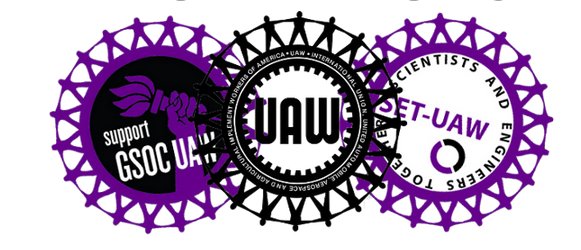
UPDATE Wednesday, Dec. 11, 11:07 p.m.:
NYU graduate employees voted to unionize themselves through the UAW.
In the election, which took place on Dec. 10 and 11, 98 percent of graduate employees voted in favor of the union representation. The bargaining unit comprises 1,247 graduate, teaching and research assistants at NYU and NYU-Poly.
In a press release, Natasha Raheja, a doctoral candidate and TA in anthropology, called the vote a victory for graduate employees.
“We are determined to reach an agreement on a strong union contract by the end of this academic year,” Raheja said.
UPDATE Tuesday, Dec. 3, 12:32 a.m.:
Theadora Tolkin, a fourth-year doctoral student studying biology, works as a hard-science research assistant. She said she will continue to work to organize research assistants even though many of them receive some external funding.
“We’re going to keep working to expand the bargaining unit, but in the meantime, I think a contract will benefit all graduate employees, as it did in the past,” Tolkin said. “The idea that collective bargaining could inhibit research is just ridiculous. [The University of Washington and the University of Massachusetts] are two of the top public research institutions in the country, bringing in billions of grant dollars a year, most of which go back to the school. Their success in raising research funds reflects the quality of the work done by graduate employees, who are unionized and protected by contracts.”
Chenguang Yu, a first-year doctoral student at NYU-Poly and graduate assistant, said he will vote in favor of UAW as a bargaining unit.
“I’m looking forward to voting yes and bargaining for improvements that will improve the graduate experience at NYU and help make NYU a more democratic institution,” Yu said.
–
Original story as follows:
NYU and the United Automobile Workers have reached an agreement that will allow graduate students to vote on representation by the Graduate Student Organizing Committee/UAW and Scientists and Engineers Together/UAW, ending a protracted dispute that has been ongoing since 2005.
NYU President John Sexton and executive vice president for Health Robert Berne announced the agreement in an email to the university community on Tuesday, which included a joint statement by NYU, the graduate employee union GSOC/UAW and its Polytechnic Institute of NYU counterpart, SET/UAW.
In the statement, the university and the UAW agreed to bargain for a contract once a majority vote confirms graduate employees support UAW representation in collective bargaining. The statement also confirmed that parties agreed to have the UAW withdraw its call for the National Labor Relations Board to review NYU’s unionization practices.
“We are confident this agreement will re-establish a trusting and productive relationship between the Union and the University, will improve the graduate student experience and will sustain and enhance NYU’s academic competitiveness,” the statement read.
The graduate employees potentially eligible for UAW representation are largely the same as those eligible under the first contract, which expired in 2005 and was never renegotiated. However, some expansions have been made.
“This bargaining unit will be expanded to cover the NYU-Poly graduate employees and employees in their sixth and seventh years of doctoral studies,” the statement read. “This agreement will enable more than 1,000 graduate employees whom we do agree have bargaining rights to choose unionization.”
Berne said the addition of NYU-Poly and doctoral employees was a modification of an offer NYU has been making to the UAW for approximately two years.
“The conversations also led to a more explicit description of the University’s neutrality commitment and a reaffirmation of the union commitment not to bargain over academic issues,” Berne said. “But beyond the specifics, the negotiation process led to a better understanding of each side’s perspectives and how they could be blended, which will form the basis for a productive relationship.”
Matthew Canfield, a spokesperson for the GSOC/UAW and a fifth-year doctoral student in the department of anthropology, said he was satisfied with the decision to hold an election for graduate students, and that he would vote in favor of UAW as a bargaining unit.
“As graduate employees, we provide huge critical support to the quality of teaching and research at NYU,” Canfield said. “As employees and students who care about the future of NYU, I think we deserve a voice in the decisions that affect our experience.”
The announcement said the university and the UAW have still not resolved their differences on the bargaining rights of research assistants in the hard sciences.
“The union saw an opening to create a union without the research assistants,” Berne said. “We saw that same opening. We’ve been talking for several weeks now and we’re able to reach what I think is a good agreement for both the union and the university.”
Berne said research assistants in the hard sciences are excluded because they are often externally funded. Other research assistants are included in the contract.
“The issue about a disadvantage [in letting research assistants organize] was made by faculty in the sciences,” Berne explained. “In general, if they lose flexibility on the issue of personnel and resource allocation, it could be more difficult to compete for grants and carry out research in a highly constrained, regulated environment.”
Julie Kushner, the UAW regional director in New York, said she supports the agreement, but the UAW will continue to fight for bargaining rights for the excluded research assistants.
“We hope the university will see the value in research assistants who are under contract,” Kushner said.
Canfield said the deal was a step in the right direction for graduate employees.
“I think having this agreement now is going to allow for the return of collective bargaining rights and put us in a position to win a contract by the end of the year,” Canfield said.
Stay tuned to nyunews.com for future updates.

























































































































































